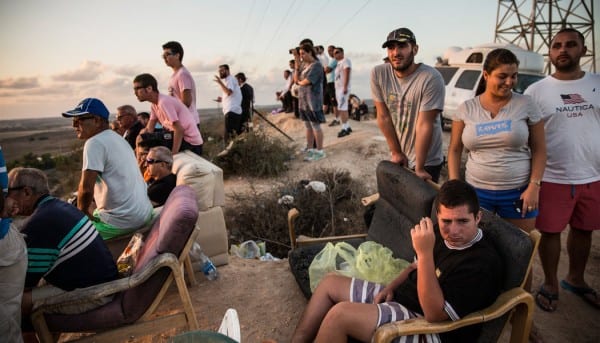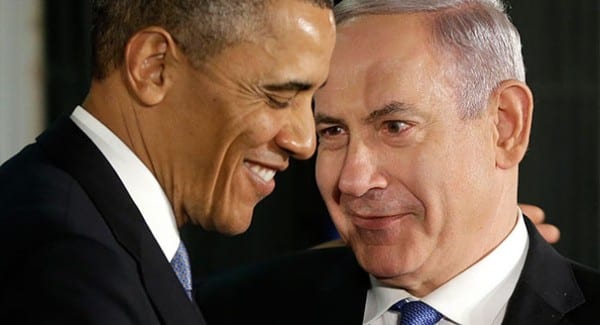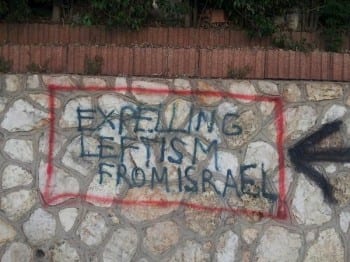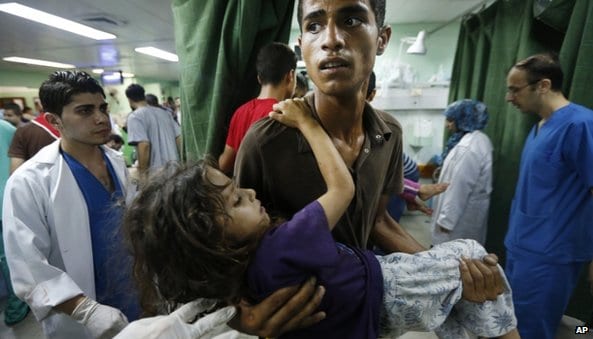The Occupation is Forever
The Enclosure of the Palestinians

“A section of the controversial Israeli barrier is seen between the Shuafat refugee camp (right) in the West Bank near Jerusalem and Pisgat Zeev (rear), in an area of Israel annexed to Jerusalem after capturing it in the 1967 Middle East war, Jan. 27, 2012.” (Credit: REUTERS/Baz Ratner/IBTimes)
[T]he ‘two-state solution’ is perennially misunderstood. The solution envisaged has nothing to do with a possible spatio-political division of Israel-Palestine and the ending of the Occupation. Rather it is a public relations device to quell the qualms of those bleeding hearts who find the current impasse unsavory, to deny the necessity (indeed the inevitability) of a ‘one-state solution’, and ultimately to ensure the continuation of the Occupation.
Ditto the ‘peace process’.
There is a hierarchy of groupings behind this long-time fraud. There are the blackguards – those who have formulated the objectives and are running the show. There are the flunkeys – those who perform the legwork publically for the blackguards (the execrable Quartet emissary Tony Blair as Exhibit A) or who cravenly bring up the rear (Europe); add the complaint media. And there are the naïfs who bear the message in their breasts, neutering themselves against informed interest and involvement in the transformation of the status quo.
There are a small number of people who fall outside this hierarchy. They are typically sometime consultants/negotiators/bureaucrats who have participated in negotiations to end the impasse. There is the rare diplomat. They are principled, accomplished and well-intentioned. But ultimately their efforts have been to no avail – to no avail because they took the ‘peace process’ seriously and were stymied by a battering ram of blackguardery.
It is surprising that such worthy individuals who have confronted at close quarters Israeli intransigence, belligerence and mendacity have not been heard of (save Richard Falk) during the current slaughter in Gaza.
It is instructive to retrieve reports (contemporaneous and mutually reinforcing) from two such individuals, reports that provide a context and perspective on this latest outrage. The authors were Alvaro de Soto, longtime UN staffer, and Yeshid Sayigh, longtime adviser/negotiator for Palestinian authorities. de Soto’s May 2007 report was written at the culmination of his (truncated) two-year stint as representative for the UN Secretary-General during the Quartet ‘roadmap’ negotiations. Thereport by Sayigh, ‘Inducing a Failed State in Palestine’, was published in Autumn 2007. The detail provides insight into the state of play seven years prior the current imbroglio, representative insight which has been forgotten in the current reportage – as if the whole conflict only began the day before yesterday.
Both reports are detailed and sober, as befits their authors’ formal role, status and experience. Extensive quotations from the reports are appropriate.
‘The international community’s attempt [via the Quartet and its ‘roadmap’] in late 2005 to promote Palestinian economic recovery reflected a long-standing assumption that economic development is crucial to the peace process and to prevent backsliding into conflict. Starting with the first international donor conference in October 1993, foreign aid was intended to demonstrate tangible peace dividends to the Palestinians as well as provide economic reconstruction and development to build public support for continued diplomacy. The Oslo agreement embodied an open-ended, incremental process with no prior agreement on Palestinian statehood, let alone on the so-called ‘permanent status’ issues: Israeli settlements, Jerusalem, borders, refugees, security and water. Rather than lever the parties into accepting specific final outcomes, the international community eschewed direct political intervention, and instead facilitated the process by underwriting practicalities and providing aid and other inducements.’ (Sayigh, 9)
‘The roadmap, still the only diplomatic instrument formally upheld by the Quartet, was at best stillborn, at worst “a way to consolidate the new status quo of no negotiations” [citing Barnea & Kastner, 2006]. … In its statement of 20 September 2005, commenting on the recent Israeli disengagement from Gaza, the Quartet promised to “support sustainable growth of the Palestinian economy and to strengthen the overall capacities of the PA to assume its responsibilities through an aggressive pursuit of state building and democratic reform efforts”. It has failed to do any of this, if not worked to opposite effect.’ (Sayigh, 28)
‘The Quartet designated James Wolfensohn to act as Quartet Special Envoy for Gaza disengagement … In the event, Wolfensohn’s mission began to run aground after his attempts to broker an agreement on access and movement were intercepted – some would say hijacked – at the last minute by US envoys and ultimately [Secretary of State Condoleezza] Rice herself. While the Agreement on Movement and Access of 15 November 2005 was painstakingly cobbled together by Wolfensohn and his high-powered team in the previous months, key alterations were made at the eleventh hour and he was virtually elbowed aside at the crowning moment.’ (de Soto, pars.9/13)
‘The international community sought to build on the momentum generated by the Israeli disengagement by restoring the conditions for accelerated economic growth in the occupied territories, but subsequently allowed this strategy to be nullified by the Israeli government’s refusal to implement its formal undertakings – a failure by omission. In contrast, the United States actively sought to induce ‘controlled’ state failure – the inability of the central authority to perform basic functions and provide essential public goods, including security – in the Hamas-led Palestinian Authority after [Hamas’ electoral victory in] January 2006. (Sayigh, 8/9)
‘… hence the undesirably punitive-sounding tone of the [US-dictated] 30 January statement [Hamas to renounce violence, no comparable demand on Israel; Hamas to recognize Israel, with undefined borders] from which we have not succeeded in distancing ourselves to this day, and which effectively transformed the Quartet from a negotiation-promoting foursome guided by a common document (The Road Map) into a body that was all-but imposing sanctions on a freely elected government of a people under occupation as well as setting unattainable preconditions for dialogue.’ (de Soto, par.50)
‘The failure of these two responses [Israeli and US intransigence] is part of the wider context of the international community’s role in overseeing the slide into state failure and humanitarian crisis.’ (Sayigh, 9)
‘[citing the World Bank, 2004] … the precipitator of this economic crisis has been “closure” – a multi-faceted system of restrictions on the movement of goods and people designed to protect Israelis in Israel itself and in the settlements. Closures have cut through the web of Palestinian economic transactions, raising the costs of doing business and disrupting the predictability needed for orderly economic life. Any sustained Palestinian economic recovery will ultimately require the dismantling of the closure system.’ (Sayigh, 9)
‘In the [Agreement on Movement and Access], the Israeli government committed itself to a number of measures [continuous crossing openings, facilitation of truck movements for trade and construction materials, etc.]. … Yet by July 2007, none of this had happened. Indeed, the agreement was a dead letter by mid January 2006.’ (Sayigh, 10/11)
‘The defeat of the regime-change strategy and the continuing inability of the international community to ensure Israeli implementation of the Agreement on Movement and Access reveal its deeper failure to define realistic strategic goals or anticipate the long-term consequences of its policy choices. This is evident in its response to two main challenges: Israeli policies and measures that have continuously created new facts on the ground and, consequently, altered the parameters for any eventual resolution of conflict; …’
‘In the first instance, the international community has repeatedly avoided confronting Israel, let alone penalising it, over unilateral measures that have transformed the landscape of the occupied territories since 2000, if not 1993. This is most evident in relation to the continued expansion of Israeli settlements in the West Bank and East Jerusalem and their associated infrastructure – over 1,200km of roads have been wholly or partially reserved for exclusive use by Israelis – despite the Oslo understandings and the explicit requirement for a ‘settlement freeze’ in the Quartet’s roadmap.
In parallel, the international community has adapted itself continuously to the constantly changing physical and administrative restrictions imposed by the Israeli Military Government and attached Civil Administration on movement and access in the occupied territories. These apply not only to Palestinians – who are additionally circumscribed by military orders, permit rules and residency requirements that often vary without notice or explanation, or are announced verbally – but also to international diplomatic and aid-agency personnel, technical experts and locally hired project staff.’ (Sayigh, 21/22)
‘By autumn [2006] it was evident that the cumulative impacts were making Gaza ungovernable, prompting UN Emergency Relief Coordinator Jan Egeland to describe it as ‘a ticking time bomb. … the result was a sharp increase in the number of Palestinians suffering extreme poverty … By May 2007, the UN was providing food aid to 1.1m in Gaza out of a population of 1.4m. …’ (Sayigh, 26)
‘The devastating consequences of the Quartet position have been well documented, including in UN Security Council briefings. … The precipitous decline of the standard of living of Palestinians, particularly but by no means exclusively in Gaza, has been disastrous, both in humanitarian terms and in the perilous weakening of Palestinian institutions. International assistance, which had been gradually shifting to development and institutional reform, has reverted largely to the humanitarian. … Thus the steps taken by the international community with the presumed purpose of bringing about a Palestinian entity that will live in peace with its neighbour Israel have had precisely the opposite effect.’ (de Soto, par.51)
‘Furthermore, the Palestinian economy has adapted to siege conditions by restructuring in problematic ways. ’Internal fragmentation’ and the ‘compression of socio-economic space’ in the West Bank since 2001 have broken down economic relations between geographic areas and actors – between districts, rural and urban communities, employers and employees, producers and markets – and severely heightened social disparities. … The cantonisation, localisation, and deformalisation of the Palestinian economy since 2000 are long-term trends, as producers adapted to territorial fragmentation and market compression by confining themselves to smaller geographical areas, moving away from manufacturing and agriculture, and shifting to payment-in-kind and unpaid family labour.’ (Sayigh, 26/28)
‘Beyond the damage wrought in terms of international assistance … there is that which has been inflicted by Israel, notwithstanding its responsibilities to the population, under international law, as occupying power: not just the killings of hundreds of civilians in sustained heavy incursions and the [wanton] destruction of infrastructure …; also the cessation of transfer to the PA, since February 2006, of the VAT and customs duties which Israel collects, under the Paris Protocol signed with the PLO pursuant to the Oslo Accords, on behalf of the Palestinians. This is money collected from Palestinian exporters and importers. It is Palestinian money. In normal circumstances it adds up to a full one third of Palestinian income. …
‘One wonders whether it is credible to judge the ability of a government to deliver when it is being deprived of its largest source of income, to which it is indubitably entitled by virtue of an agreement endorsed by the Security Council, by the State which largely controls the capacity of that government and its people to generate income. In fact, the PA government is being expected to deliver without having make-or-break attributes of sovereignty such as control of its borders, the monopoly over the use of force, or access to natural resources, let along regular tax receipts.’ (de Soto, pars.52/53)
‘I should make clear that I do not for a nanosecond condone the failings of the Palestinian side, notably its incapacity or unwillingness to comply with its obligations under the Road Map. … But it is also true that Israeli policies, whether this is intended or not, seem frequently perversely designed to encourage the continued action by Palestinian militants.’ (de Soto, pars.74/75)
‘In truth, the PLO is an entitled to ask of Israel whether it is a partner as Israel regularly asks of the PLO and PA.’ (de Soto, pars.21/22)
‘It is worth being aware that the combination of PA institutional decline and Israeli settlement expansion is creating a growing conviction among Palestinians and Israeli Arabs, as well as some Jews on the far left in Israel, that the two State solution’s best days are behind it. Given that a Palestinian State requires both a territory and a government, and the basis for both is being systematically undermined, they believe the only long-term way to end the conflict will be to abandon the idea of dividing the land and, instead, simply insist on respect for the civil, political and national rights of the two peoples, Jews and Arabs, who populate the land, in one State. The so-called “one State solution” is gaining ground. … In the meantime, Israel has sought refuge in, and locked itself into, an essentially rejectionist stance with respect to dealing with the Palestinians, by insisting on preconditions which they must know are unachievable.’ (de Soto, pars.128/131)
Sayigh and de Soto demonstrate that the Quartet’s roadmap was a farce. Elaborate in structure, hollow in substance. Israel was never going to make any concessions (consistent with its intransigence since the 1993 Oslo Accords). And the US was ensuring that Israel’s intransigence came up trumps.
Sayigh diplomatically refers to ‘the international community’, but the US was and is dictating subservience to Israel’s agenda. Europe remained and remains abjectly obedient and Russia, briefly formally involved, remained indifferent and preoccupied elsewhere.
But exposed behind the bureaucratic language of de Soto and Sayigh is the fact that Israel/US and its satraps have been strategically engaged over an extended period in ethnic cleansing of a subject people. This is an unspeakable crime, yet all authoritative organizations not directly responsible for the crime without exception blame the victims or look the other way.
The UN itself and its organizations have de facto legitimized the ongoing crime. This, in spite of the fact that billions of dollars of UN funds have been devoted to compensating for the devastation wreaked by Israel – propping up crippled Palestinian institutions, provisioning desperate populations and replacing destroyed infrastructure (including UN infrastructure) while Israel has continued to treat the UN with contempt.
Let us confront what the major powers and the international bodies were asking of Palestinian leadership in the Quartet roadmap. It (meaning Fatah, Hamas excluded by edict) was meant to clean up its inefficient and corrupt administrative structure and enforce security against Israel-directed violence. In return, funds would be disbursed with the hope of improving the Palestinian economy which in turn was intended to generate civility and pacificity amongst ‘the natives’.
The Occupation, supposedly condemned at international law, is legitimized. The fundamental flaws of Oslo – ‘no prior agreement on Palestinian statehood, let alone on the so-called “permanent status” issues’ – are reinforced. It is demanded of the victims that they further debase themselves. And Israel is permitted, carte blanche, to defy what minor obligations it has and to cherish as indelible its systemic crimes against the Palestinians.
As Sayigh (23) notes:
‘The international community has consistently misjudged the extent to which the Palestinian Authority is “less than a state, yet expected to act like a state”. … the authority lacked effective, let alone sovereign, control over many of the policy levers and tools it needed to fulfil the tasks set for it.’
Elementary, my Dear Watson. The absurdity couldn’t have been missed by its proponents. Not least when Israel perennially engages in sweeping arrests of those seeking to exercise authority, as it did during this vital period in 2005-06.
Both Sayigh and de Soto criticise the manifest failings of the factions that control and vie for control of the Palestinian leadership. But even political structures and its personnel in nation states with sovereignty and functioning governmental apparatuses are prone to incompetence and corruption. Here, it is demanded that those seeking leadership roles function as if in possession of sovereign powers, rights and attendant institutional capacities while forced, through deprivation of those powers and capacities, to remain as Quislings. That is, if they’re not languishing in an Israeli prison.
The script is laughable, raw material for Opera buffa. But it has been written by sadists, unrepentant racists in an era when racism has been universally renounced as passé, and its consequences have been diabolical.
Nothing asked of the Palestinians could possibly be expected to work in their interests.
Thus we have the sustained Mengelian laboratory experiment in the Occupied Territories of sustained deprivation of liberty, livelihood and humanity. Thus we have the mass murders in Gaza (have I missed any?) of 2006, 2008-09, 2012, and at present. More will come as night follows day. This is the Israeli revenge against Palestinians for persisting audaciously to inhabit land mandated exclusively to its rightful inhabitants presently thwarted from its possession in toto.
de Soto’s report attracted a little media attention at the time. The report was mentioned in the British Guardian, 13 June 2007. The author notes: ‘The highest ranking UN official in Israel has warned that American pressure has “pummelled into submission” the UN’s role as an impartial Middle East negotiator in a damning confidential report.’ Quite, although the article neglects to bring out de Soto’s implicit condemnation of the West’s complicity with and guardianship over Israel’s crimes.
However, an article on Inter Press Service, 15 June, articulates accurately the tenor of the de Soto report and its implications. Not merely did de Soto condemn the US’ partisanry (which included funding the defeated Fatah to engage militarily with Hamas personnel) but he accused the then Secretary-General, Kofi Annan, of failing to ensure the independence and leverage of UN personnel in the pursuit of just resolutions. And, notes the article, incoming Secretary-General Ban Ki-moon proved to be more concerned over the disclosure of the confidential report than over the shocking implications of its contents.
The significant reports of de Soto and Sayigh disappeared into the ether. Within a year, the Gaza Strip had been completely and indefinitely closed off, putting the Gazans on a starvation diet that they have endured until this day. The blackguards duly arranged a purported resurrection of the roadmap at Annapolis in November 2007, at which the hapless Abu Mazen presented his wish list with ambitions for a speedy resolution within a year. Mazen was then instructed to suck eggs and the Israeli/US agenda, naturally, has since prevailed.
Israel’s ‘security concerns’ is code for Israel’s lebensraum, its idée fixe. Israel commands the cycle of repression and killing as integral to its ongoing land grab, which naturally invites resistance, which threatens Israel’s security, which results in more repression and killing and more land grabs.
Two-state solution my arse. Is there any reason to expect an extinguishment of Israel’s ‘security concerns’ until the Palestinians have themselves been extinguished from the terrain? None whatsoever. Then Israel can start work full-time on its neighbors.
Evan Jones is a retired political economist from the University of Sydney. He can be reached at: evan.jones@sydney.edu.au






